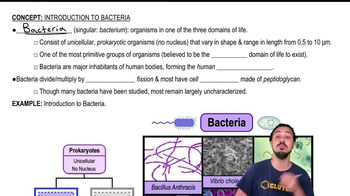Explain the effects of excess antigen and antibody on the precipitation reaction. How is the precipitin ring test different from an immunodiffusion test?
Ch. 17 - Adaptive Immunity: Specific Defenses of the Host
All textbooks Tortora 14th Edition
Tortora 14th Edition Ch. 17 - Adaptive Immunity: Specific Defenses of the Host
Ch. 17 - Adaptive Immunity: Specific Defenses of the Host Problem 18.6a
Problem 18.6a
 Tortora 14th Edition
Tortora 14th Edition Ch. 17 - Adaptive Immunity: Specific Defenses of the Host
Ch. 17 - Adaptive Immunity: Specific Defenses of the Host Problem 18.6a
Problem 18.6aChapter 13, Problem 18.6a
In an immunodiffusion test, a strip of filter paper containing diphtheria antitoxin is placed on a solid culture medium. Then bacteria are streaked perpendicular to the filter paper. If the bacteria are toxigenic,
a. the filter paper will turn red.
b. a line of antigen–antibody precipitate will form.
c. the cells will lyse.
d. the cells will fluoresce.
e. none of the above
 Verified step by step guidance
Verified step by step guidance1
Understand the purpose of the immunodiffusion test, which is to detect the presence of specific antigens or antibodies through the formation of a precipitate.
Recognize that the test involves a filter paper with diphtheria antitoxin, which will interact with any diphtheria toxin produced by the bacteria.
Consider the mechanism of antigen-antibody interaction, where a visible line of precipitate forms when the antigen (toxin) and antibody (antitoxin) meet and react.
Evaluate the options given: a red color change, cell lysis, fluorescence, or precipitate formation, and relate them to the expected outcome of an antigen-antibody reaction.
Conclude that the formation of a line of antigen-antibody precipitate is the expected result if the bacteria are toxigenic, as this indicates the presence of the diphtheria toxin.

Verified Solution
Video duration:
2mWas this helpful?
Key Concepts
Here are the essential concepts you must grasp in order to answer the question correctly.
Immunodiffusion Test
An immunodiffusion test is a laboratory technique used to detect the presence of specific antigens or antibodies in a sample. In this test, antigens and antibodies diffuse through a gel or solid medium, allowing for the formation of visible precipitin lines where they meet. This method is particularly useful for identifying toxigenic bacteria by observing the interaction between bacterial products and specific antibodies.
Recommended video:
Guided course

The Ames Test
Toxigenic Bacteria
Toxigenic bacteria are microorganisms that produce toxins, which are harmful substances that can cause disease in hosts. In the context of the immunodiffusion test, if the bacteria are toxigenic, they will produce toxins that interact with the diphtheria antitoxin present on the filter paper, leading to a specific immune response. This characteristic is crucial for diagnosing infections caused by such bacteria.
Recommended video:
Guided course

Introduction to Bacteria
Antigen-Antibody Precipitation
Antigen-antibody precipitation occurs when soluble antigens react with specific antibodies, forming a visible precipitate. This reaction is a key principle in immunological assays, including the immunodiffusion test. The formation of a precipitin line indicates a successful interaction between the antigens produced by the bacteria and the antibodies in the test, confirming the presence of toxigenic bacteria.
Recommended video:
Guided course

Outcomes of Antibody Binding to Antigen
Related Practice
Textbook Question
112
views
Textbook Question
Use the following choices to answer questions 4 and 5:
a. anti-Brucella
b. Brucella
c. substrate for the enzyme
Which item is from the patient in an indirect ELISA test?
103
views
Textbook Question
DRAW IT Label components of the direct and indirect ELISA tests in the following situations. Which test is direct? Which test provides definitive proof of disease?
<IMAGE>
100
views
Textbook Question
How does the antigen in an agglutination reaction differ from that in a precipitation reaction?
103
views
Textbook Question
Use the following choices to answer questions 7–9.
a. direct fluorescent antibody
b. indirect fluorescent antibody
c. rabies immune globulin
d. killed rabies virus
e. none of the above
Treatment given to a person bitten by a rabid bat.
101
views
Textbook Question
Match the following serological tests in column A to the descriptions in column B.
<IMAGE>
115
views